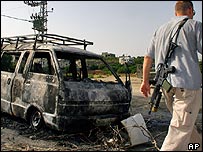Untitled Document
 |
Attacks on Jewish settlers
earlier this week prompted the strike |
The attack happened soon after leaders of both sides sat down for talks in Jerusalem
on Tuesday, later described as disappointing by the Palestinians.
Targeted killings of Palestinian militants by Israel had been on hold since
a truce was agreed in February.
In a separate incident on Wednesday, Israeli aircraft fired missiles at a rocket
launcher in northern Gaza.
Witnesses said the strike was aimed at a group preparing to launch rockets
across the border into Israel from the village of Beit Lahiya. They reported
no casualties.
There was no immediate word from the Israeli military on Wednesday's attack.
Earlier, a senior Israeli official warned such attacks could continue if Palestinian
leaders do not stop the militants.
And Foreign Minister Silvan Shalom said they would send troops into Gaza after
Israel's planned withdrawal if the attacks by militants continued.
Fragile ceasefire
Tuesday's air strike came in response to a spate of attacks on Jewish settlements
at the weekend.
"There was an attempt... to neutralise one of the members of this movement
which failed," Public Security Minister Gideon Ezra told Israeli radio.
"An opportunity presented itself at a precise moment in time and place. If
the Palestinian Authority will not act then we will have to do it."
Correspondents say his remarks indicate that Israel has resumed its policy
of targeted killings against militants of Islamic Jihad.
In the past, Israeli air strikes have deliberately targeted and killed numerous
Palestinian militants, including two leaders of the larger Hamas group.
Such killings were put on hold after both sides agreed to a fragile ceasefire
- seen as a crucial element in the effort to restart the Middle East peace process
- at the Egyptian Red Sea resort of Sharm el-Sheikh in February.
'Continued strikes'
Islamic Jihad said it carried out an attack near the Jewish settlement of Hermesh
in the West Bank on Monday, which left an Israeli dead.
The group said it was in retaliation for what it called the desecration of
the Koran at a prison in Israel, a charge Israel denies.
More than 50 suspected members of Islamic Jihad were rounded up by Israeli
forces, hours before Israeli Prime Minister Ariel Sharon and Palestinian leader
Mahmoud Abbas were due to meet.
Israel's Haaretz newspaper said the targeted assassination happened 10 minutes
after the high-level meeting opened in Jerusalem.
A senior aide to Mr Sharon said such air strikes may continue during Israel's
withdrawal of Jewish settlements from the Gaza Strip if militant attacks continue
- even if it means "major collateral damage".
"Israel will act in a very resolute manner in order to prevent terror
attacks and [militant] fire while the disengagement is being implemented,"
said Brigadier-General Eival Giladi was quoted by the paper as saying.
"If pinpoint response proves insufficient, we may have to use weaponry
that causes major collateral damage, including helicopters and planes, with
mounting danger to surrounding people."

